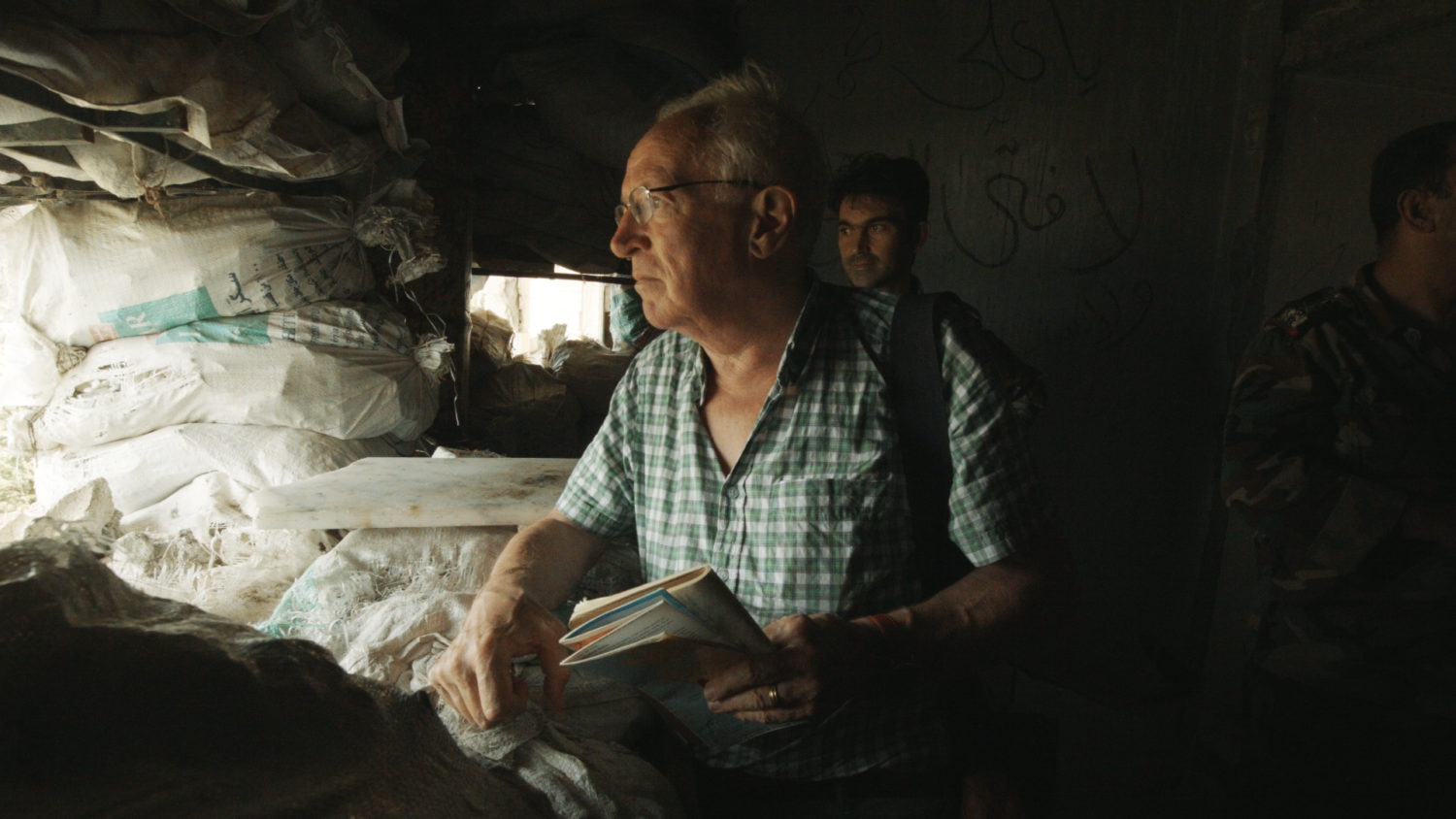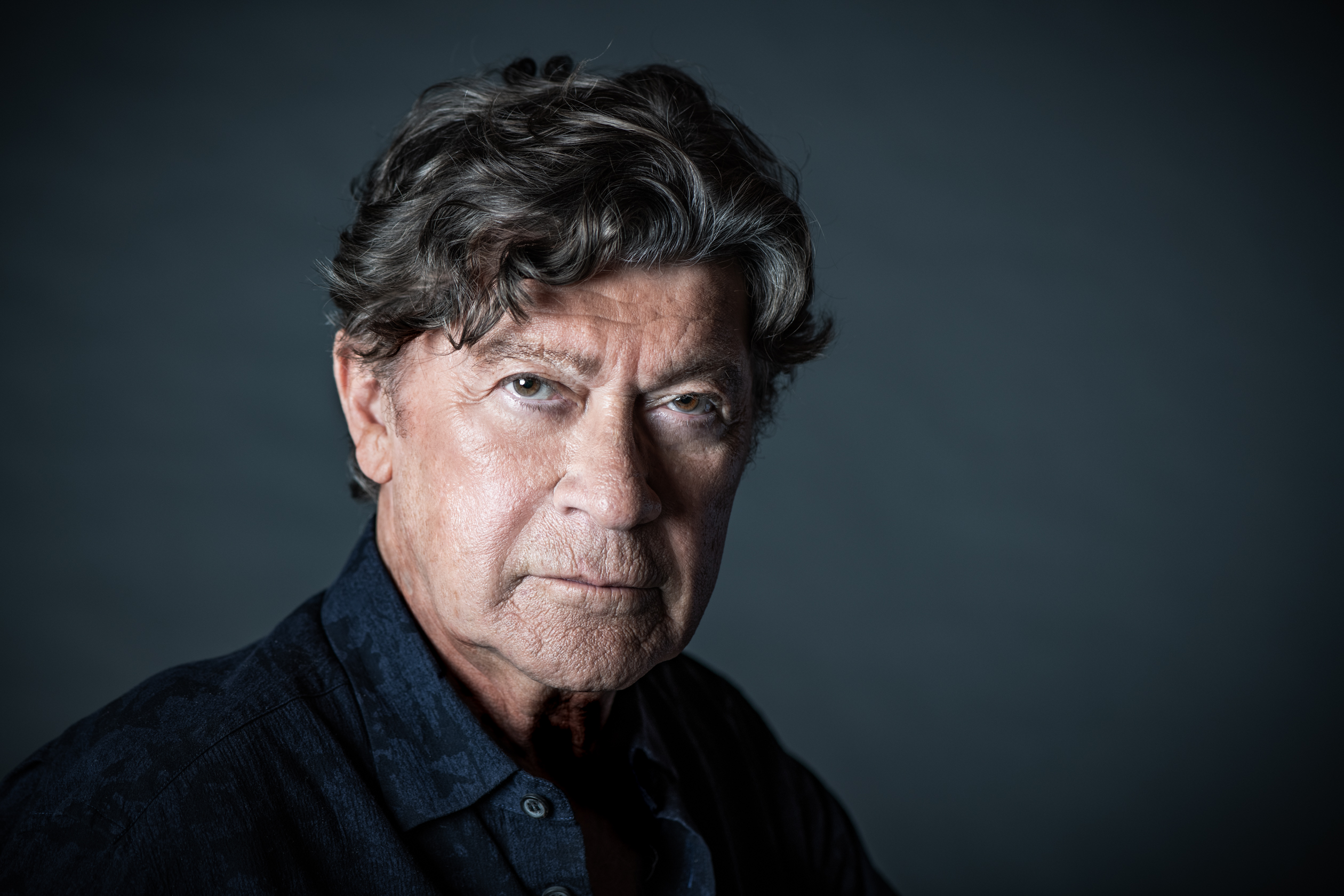“With Fisk, one cannot walk down the street without fully understanding the history that marks that place,” observes director Yung Chang on filming veteran Independent journalist Robert Fisk in This Is Not a Movie. “His past is so fluidly melded into his present. That struck me as very important in understanding how he works.”
Chang, the acclaimed director of Up the Yangtze (2007) and China Heavyweight (2012), accompanies Fisk on investigative tours throughout the Middle East in this NFB co-pro presented by Telefilm Canada. Fisk follows his nose, ferreting out stories and questioning everything. The old-school foreign correspondent is the eye through which Chang observes a shifting media landscape at a time when the truth has never been less popular or harder to come by. Fisk’s story is a compelling reminder of just how real the news can be.
Speaking with POV from Cologne, Germany, ahead of the film’s world premiere at TIFF, Chang says he first discovered Fisk through the alternative news website ZNet during his university days. “This was early 2002, post 9/11, and I was really engaged with what Fisk was writing,” says Chang. “It seemed so off-kilter to mainstream media.”
Challenging the perceived objectivity of “balanced” journalism, Fisk’s viewpoint shines through his work, as does his ability to interrogate all sides of a conflict. Chang follows Fisk through Beirut, Homs, Aleppo, Douma and Palestine as he trails scoops, fearless of bullets and editors while delivering reports that are, as Fisk says, “neutral and unbiased on the side of those who suffer.” Each journey brings Fisk in contact with voices that go unreported in mainstream media.
“We started when Fisk was around seventy-two,” explains Chang on his approach to the shoot. “But he’s still active, still thinking, and still writing incendiary articles and cracking forward-thinking stories. This had to be an active story.”
Chang’s dynamic approach taps into Fisk’s energy and journalistic rigour. “There were no second takes,” says Chang. “This was happening live and what you missed, you missed, so you had to be on your toes following the action, following Robert, literally chasing after the story as he was chasing after his story.” Chang says they made Fisk an active presence, rather than a host or anchor, using Blackmagic URSA Mini cameras that let them film unobtrusively alongside the reporter as he interviewed subjects. The effect lets viewers feel the rush and the immediacy of Fisk’s on-the-ground inquires.
Chang readily admits that seeing Fisk’s reportage and deep understanding of the Middle East fuelled his desire to make the film after early research in 2016. “Everything went sort of wacky,” reflects Chang, who was making the anthology film 11/8/16 in Vermont when Trump was elected. “I had this sinking feeling that we’re in a different world. It hammered it home for me. I had a young daughter on the way and wondered about this place we inhabit right now. [With this film,] I felt I could deepen my understanding of how to interact with the news and how we report.”
In addition to the on-the-ground reportage, Chang probes the human element of journalism through an extraordinary interview intercut throughout the film. Everything is on the table as Fisk speaks passionately about his career. His reactions to some questions are physical, particularly when Chang asks about his father, who fought in World War I and refused to take another man’s life. Chang admits that interviewing the seasoned journalist was daunting despite his own experience questioning people in his earlier docs. “Interviewing Fisk is quite another situation,” observes Chang. “He knows the technique and can feel instinctually when I’m going in one direction or trying to manipulate him in another direction.”
Chang says that veteran doc director Shelley Saywell gave him valuable advice. “She said, ‘Just have a conversation with him. Put down the notes.’” Chang credits Saywell’s advice for the interview’s off-the-cuff dynamic that opened up Fisk’s story. “All you need to do with Fisk is throw a nugget and he’ll just take off. Out of that, we caught this slightly awkward, slightly confessional moment that’s quite telling.”
Fisk’s past also arises through extensive archival footage of his coverage for outlets like the Times. Chang mixes footage of Fisk in Belfast during the Troubles with his present-day work in the Middle East. Contemporary footage and archival reels blend as Fisk retraces his footsteps in Palestine, where he once told the story of a displaced family, and in a particularly compelling sequence in Beirut, in which he returns to the site of the Sabra and Shatila massacre. These archival elements, sharply weaving past and present in the editing by Mike Munn (Stories We Tell), convey the experience Fisk has gained during forty years in the Middle East. The collage of past and present illustrates how many problems on which Fisk reports don’t have the Hollywood endings the West desires.
Fisk’s archive is central to the film’s forward thrust. Chang says “nothing was restricted” from Fisk’s arsenal. His footage, reports, notes and photographs show the range of evidence, research, and experience that support his stories. Chang adds that he and Munn built Fisk’s love for analogue into the film’s aesthetic to convey the integrity of his work.
“We made a creative point not to scan the photos, but actually photograph the photographs and documents,” explains Chang. “We were inspired by old-school methods, like Chris Marker’s Sans Soleil with this approach of seeing the grain in the photos, taking it back to the analogue way you see in Fisk’s archaic archival process.”
Chang calls himself a “purist” when asked about shooting on film versus digital. He relates to Fisk’s methods. “There’s a grain and a quality and a depth to the image that is unmatched in digital video,” says Chang, adding that some sequences were shot on 16mm but didn’t make the final cut, although he did 35mm still photography throughout production. Like Fisk’s pragmatic views on print versus digital news, though, Chang agrees that each method has its benefits.
Chang also shares Fisk’s compulsion to travel and tell stories from around the word. “My upbringing informed my filmmaking and I think as a Chinese-Canadian, I’ve always felt uprooted and between two worlds—rarely have I looked in my own backyard for a story,” observes Chang. “For me, it’s always been about going to places like China, where I’m comfortable as an insider/outsider.” More challenging, Chang says, were shoots for docs like The Fruithunters (2012) or Gatekeeper (2016), which introduced him to new languages and cultures.
“What I like and find necessary in this day and age is to step outside of our comfort zone and go to places where we don’t understand the culture, the language,” observes Chang. “Robert Fisk says in the film that it doesn’t take a lot to buy an airplane ticket to go somewhere and experience something yourself. [That way] you’ll learn so much more about a place, a people or a culture.”










